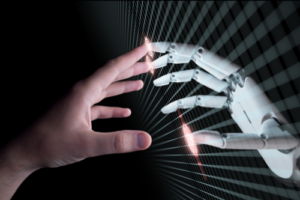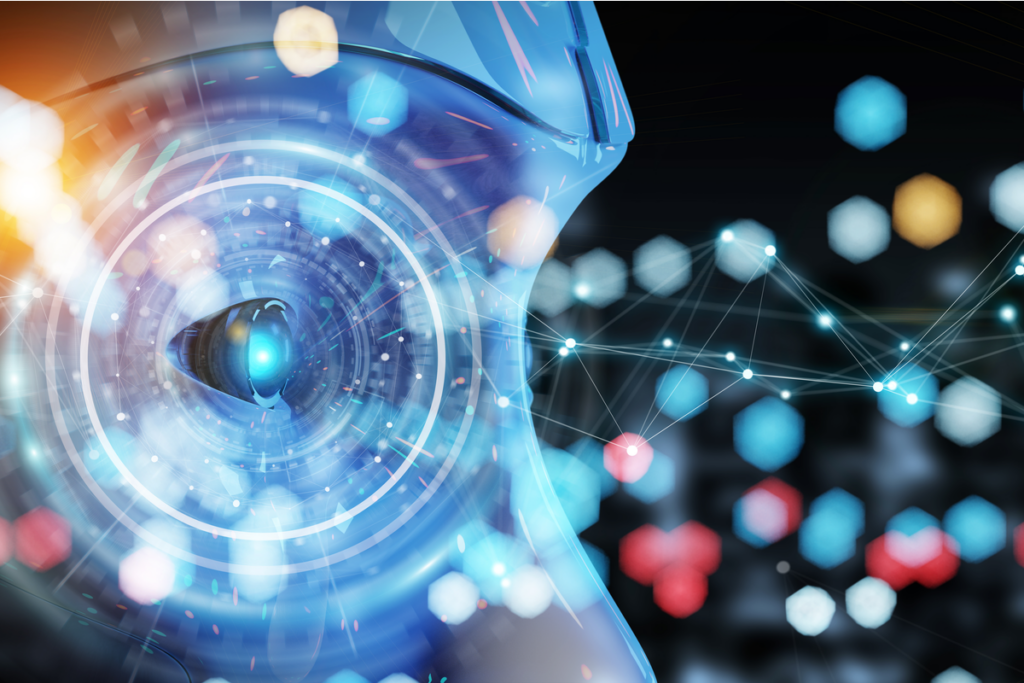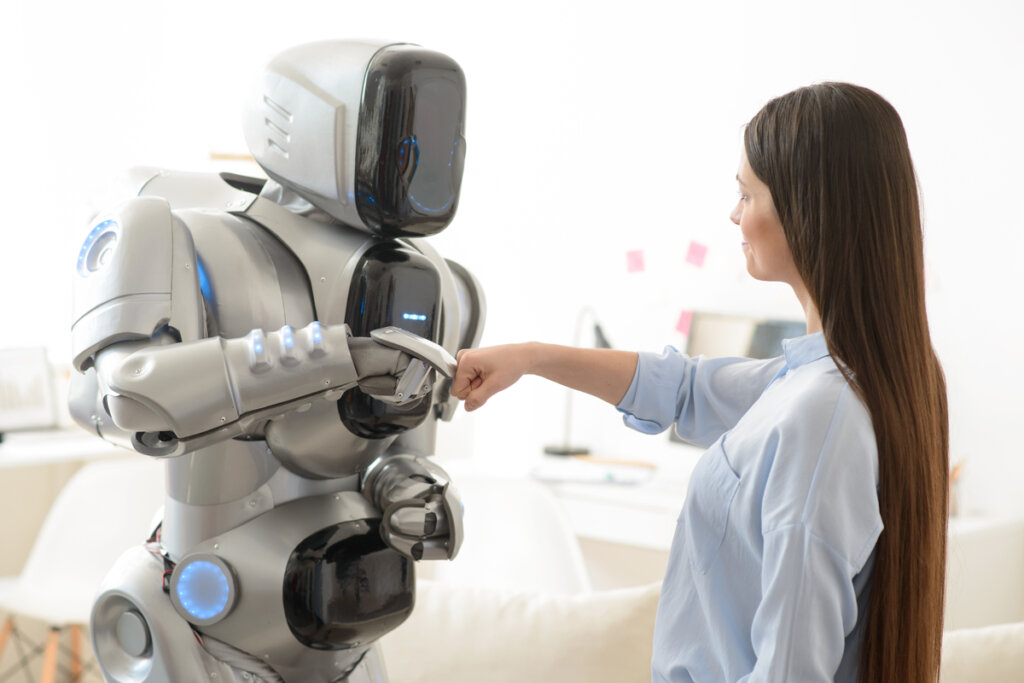The Great Replacement: Will Artificial Intelligence Take Your Job?


Written and verified by the psychologist Valeria Sabater
When the steam engine arrived in our society and laid the foundations for the great industrial revolution, Lord Byron saw this progress as a threat. It can’t be denied that the social transformation that these advances brought about was immense. In a way, it also blurred the life models to which many clung. Curiously, Lord Byron’s daughter, Ada Lovelace, contributed to this development.
She was a pioneer in the field of programming. In fact, she wrote the first algorithm to be processed by an analytical engine or mechanical computer. Curiously, in her notes and according to one of her biographers, Betty Alexandra Toole, she speculated on what could happen if, in the future, these engineering companies came to think for themselves.
Indeed, Ada Lovelace anticipated what we now understand as artificial intelligence. In other words, a technology that, thanks to algorithms and training, can carry out a series of tasks in the same way that people do. Its arrival, like the steam engine in the 18th century, has proved to be something of a revolution. However, at what price?
Google has just announced the launch of Bard, an artificial intelligence chatbot extremely similar to ChatGPT.

A wave of layoffs in the technology sector
In recent months, we’ve been witnessing a steady trickle of layoffs at big tech companies. For example, Google, Amazon, Meta, Alphabet, Dell, Twitter, Microsoft, and many other industry giants have fired nearly a quarter of a million people. According to the managers, it’s due to personnel adjustment.
Some point out that it’s due to the need for replacements. In effect, they’re looking for new and more talented figures. Others talk of the bursting of the ‘dot-com bubble’. It seems that the idea that certain personalities in the field of technology and social media are seen as authentic gods is changing.
To this, we must add inflation, lack of components, and quarterly balance sheets that no longer add up. The technology crisis has arrived and no one can deny it. However, there’s a third factor that also carries great weight. It’s been discussed in recent articles such as the one published in Forbes magazine. They suggest that the ‘great replacement’ has already begun.
Artificial intelligence: ‘the great replacement’
While thousands of people have been laid off in the technology sector, the investment in artificial intelligence in these companies has reached astronomical figures. For example, Microsoft recently laid off five percent of its workforce. However, at the same time, it was making an investment of ten billion dollars in Open AI, the leading company in this field of development.
The ‘great replacement’ defines the process in which artificial intelligence ends up taking over the work that, until not long ago, people had been doing. As a matter of fact, this process began decades ago. For instance, when Elvis was triumphing on stage, factories already had robots that made it easier to build cars.
Today, artificial intelligence is a multifaceted tool that everyone wants to take advantage of. According to the State of AI in the Enterprise report, published in Deloitte Insights in 2019, close to 57 percent of business leaders know that this tool will be key on a daily basis in every organization. Indeed, this phenomenon is now really starting to take off.
The intelligent chats that’ll change everything
Not long ago, we witnessed the appearance of ChatGPT. The purpose of this artificial intelligence is to help users in the search for any information. It can even assist in the writing of texts, news, or reports. Just a few days ago, Google announced the imminent arrival of Bard. It’s another AI chatbot based on a linguistic model. This means we can talk to it.
The fact that a good number of large technology companies want to have their own chatbot means that, right now, many programmers and people are required to train artificial intelligence in this way. However, they’ll eventually be replaced by the AI itself, which will know how to do the work of any engineer.
The ‘great replacement’ will mean that increasingly fewer employees will be needed in companies. That’s because these AI systems will do the jobs of numerous workers. In fact, the investments that are now being made in the development of these systems will save costs in the future by automating a multitude of tasks and replacing people with machines.
“If we have learned one thing from the history of invention and discovery, it is that, in the long run – and often in the short one – the most daring prophecies seem laughably conservative.”
-Arthur C. Clarke-
Artificial intelligence in the future
To think that, within ten or fifteen years, many of our jobs could disappear traces a really dystopian future. Moreover, a terrifying one. That said, it’s insisted that artificial intelligence will only take care of the tasks that are repetitive, mechanical, or that require data collection, analysis, customer service, file maintenance, etc.
The fact that AI systems will be in charge of more routine or analytical tasks should mean that workers can focus on more complex aspects. We should also bear in mind that this engineering lacks creativity, has no emotions, and doesn’t possess the ability to gain the trust of humans.
Research conducted by Central Oklahoma University and Beijing Labor Relations University highlights the implications artificial intelligence will have on our development as a society. The study claims that there’ll undoubtedly be a ‘great replacement’. Moreover, we’ll be forced to reformulate our lives and jobs and adjust to new scenarios and other demands.

A challenge with ethical and psychosocial issues
Changes are scary. Yet, they often arrive gradually and we tend to hardly notice them. Artificial intelligence and robots have been with us for years, but new transformations are coming in the approaching months and years. However, imagining that machines will end up making decisions for us takes us back to Arthur C. Clarke’s HAL 9000 robot.
Scientific and technological progress always brings periods of crisis and new revolutions. Its objective is none other than to try to make our lives easier and to contribute to our progress as a society and as humanity. That said, these evolutionary leaps aren’t exempt from certain ethical and psychosocial challenges.
The question remains of how the loss of jobs and its effects on people can be addressed. How can educational systems be reformulated to adjust to these new technological horizons? Where will the line be drawn on what machines can and can’t do? In reality, the ‘great replacement’ is already here and these are the kinds of issues that must be resolved as soon as possible.
All cited sources were thoroughly reviewed by our team to ensure their quality, reliability, currency, and validity. The bibliography of this article was considered reliable and of academic or scientific accuracy.
- Holt-Lunstad, Julianne; Smith, Timothy B. y Layton, J. Bradley (2010): «Social Relationships and Mortality Risk: A Meta-Analytic Review», PLOS Medicine, 27 de julio de 2010. Doi https://doi.org/10.1371/journal.pmed.1000316.
- State of AI in the Enterprise», 2ª ed., Deloitte Insights, informe, 2018. Disponible en https://www2.deloitte.com/content/dam/insights/us/articles/4780_State-of-AI-in-the-enterprise/DI_State-of-AI-in-the-enterprise-2nd-ed.pdf.
This text is provided for informational purposes only and does not replace consultation with a professional. If in doubt, consult your specialist.








